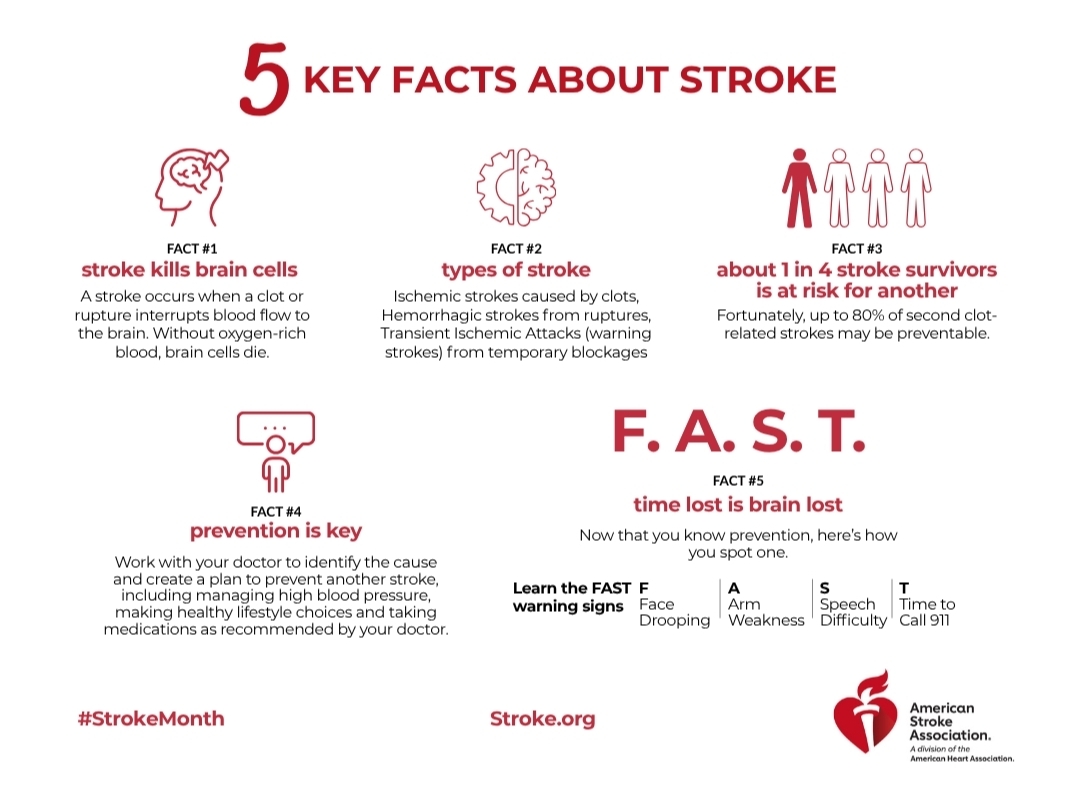May is American Stroke Month. The American Stroke Association, a division of the American Heart Association, uses this month to raise awareness about the F.A.S.T. stroke warning signs and the importance of taking action to prevent a future stroke.
A stroke occurs when normal blood flow in the brain is interrupted. When parts of the brain don’t get the oxygen-rich blood they need, those cells die. Quick identification and treatment of stroke improve the chances of survival and recovery.
A stroke is an emergency. If someone is having a stroke, they must get medical attention right away.
Strokes can happen to anyone at any age. Having a stroke puts you at higher risk for a second one. Most adults in the U.S. don’t know the warning signs, and that it is largely treatable if you call 911 as soon as you recognize the symptoms.
Learn the warning signs
Knowing the warning signs could help save a life. Learn to spot the signs with the acronym F.A.S.T.
- F = Face drooping or twisting
- A = Arm weakness
- S = Speech difficulty
- T = Time to call 911
High blood pressure is a leading cause and controllable risk factor for stroke and heart disease. The best way to know if you have a healthy blood pressure is to have it checked by a doctor or other healthcare professional. Understand your risk factors and talk to your healthcare provider about how to prevent a stroke.
Did you know?
- Stroke is the fifth-leading cause of death in the U.S.
- It is the No. 3 cause of death in women and kills more women than men.
- It is a leading cause of serious, long-term disability in the U.S.
- Among all people in the U.S., Black and Hispanic people are less likely to know the common stroke warning signs, according to an American Stroke Association Ad Council Stroke Continuous Tracker Survey. The root causes of these disparities are not yet fully understood.
- Women face unique issues that can increase their risk of stroke, including the use of oral contraceptives, high blood pressure during pregnancy, and other pregnancy complications such as premature birth, endometriosis, and early onset of menopause.
- Black women have the highest prevalence of high blood pressure and stroke among women.
- Hispanic people in the U.S. face a high risk of stroke, in part, due to unmanaged risk factors including diabetes, obesity, and cholesterol.
Together, we can change the future of health and transform lives.
Her Nexx Chapter is a strategic collaborator of the American Heart Association, working to advance health and hope for everyone, everywhere.
Get tickets now to our Inspire Her Nexx Chapter Conference taking place August 29-31, 2025, at the Hilton Anatole in Dallas, Texas.
Content source: https://www.stroke.org/en/
The Future of Connection for Women








0 Comments